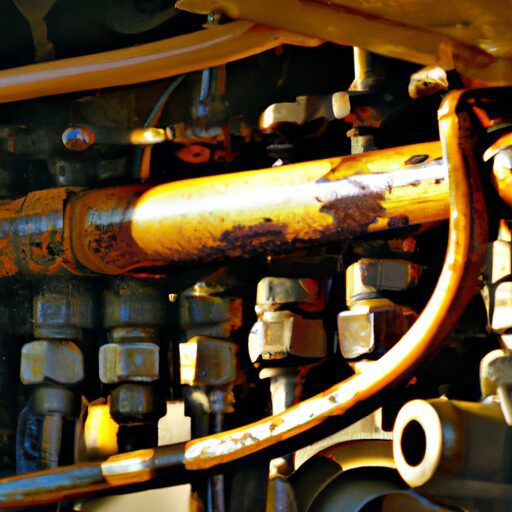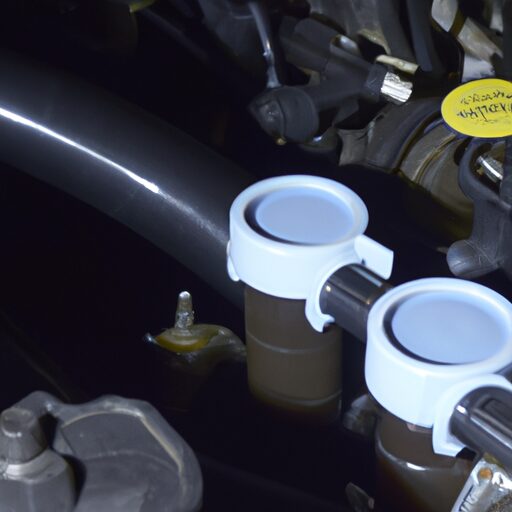Dump Truck Hydraulic Fluid Type
Dump trucks are essential vehicles in the construction and mining industries, used for transporting heavy loads of materials. The hydraulic systems in these trucks play a crucial role in their operation, providing the power needed to lift and unload materials efficiently. One vital component of these hydraulic systems is the hydraulic fluid, which acts as a medium for transmitting power and lubricating moving parts. Selecting the appropriate hydraulic fluid type is crucial for ensuring optimal performance and longevity of the dump truck’s hydraulic system.
This article aims to provide an in-depth analysis of the different types of hydraulic fluids commonly used in dump trucks. It will explore the characteristics, benefits, and considerations associated with mineral oil-based fluids, synthetic fluids, and biodegradable fluids. Additionally, it will discuss factors that should be taken into account when choosing hydraulic fluid for dump trucks and highlight proper maintenance practices to ensure reliable performance. By gaining a comprehensive understanding of dump truck hydraulic fluid types, readers will be empowered to make informed decisions regarding their choice of hydraulic fluid for their specific application needs.
Common Types of Hydraulic Fluids Used in Dump Trucks
Various types of hydraulic fluids are commonly used in dump trucks to ensure efficient and reliable operation. The choice of hydraulic fluid is critical as it can significantly impact the performance and longevity of the dump truck’s hydraulic system. There are several common alternatives when it comes to hydraulic fluid selection, each with its own set of characteristics and benefits.
Factors affecting the performance of hydraulic fluids include viscosity, oxidation stability, wear protection, rust prevention, and foam resistance. Viscosity determines how well the fluid flows through the system at different temperatures, while oxidation stability refers to the fluid’s ability to resist degradation due to exposure to air. Wear protection is crucial for preventing damage to components under high pressure or heavy load conditions. Rust prevention properties are important for protecting metal surfaces from corrosion caused by moisture or other contaminants in the environment. Lastly, good foam resistance helps maintain proper lubrication and prevents air bubbles from impairing system performance.
Mineral oil-based fluids are one of the most common types used in dump trucks due to their excellent lubricating properties and wide availability. They offer good overall performance and cost-effectiveness, making them a popular choice among operators. Furthermore, mineral oil-based fluids provide adequate protection against wear, rust formation, and foaming issues that may affect dump truck hydraulics.
In summary, understanding the common alternatives available and considering factors such as viscosity, oxidation stability, wear protection, rust prevention, and foam resistance is crucial when selecting hydraulic fluid for dump trucks. Mineral oil-based fluids offer satisfactory performance in these areas without compromising efficiency or reliability.
Characteristics and Benefits of Mineral Oil-based Fluids
Mineral oil-based fluids offer several advantageous characteristics and benefits. Firstly, they are highly cost-effective due to their wide availability and lower production costs compared to synthetic alternatives. Additionally, these fluids possess good lubricating properties, reducing friction between moving parts and promoting smooth operation of hydraulic systems. Their technical attributes make mineral oil-based fluids a popular choice in various industries that require reliable and efficient hydraulic systems.
Cost-effectiveness
To maximize cost-effectiveness, it is crucial to carefully consider the type of hydraulic fluid used in dump trucks, as selecting the appropriate fluid is akin to choosing the right fuel for an engine, ensuring optimal performance and efficiency. When conducting a cost analysis, mineral oil-based fluids prove to be a wise choice due to their long-term savings potential. Here are four reasons why:
- Lower Maintenance Costs: Mineral oil-based fluids have excellent lubricating properties that reduce wear and tear on hydraulic components, resulting in fewer repairs and replacements.
- Longer Fluid Life: These fluids have high thermal stability and oxidative resistance, allowing them to maintain their performance over extended periods without degradation.
- Increased Efficiency: The viscosity characteristics of mineral oil-based fluids ensure smooth operation at various temperatures, enhancing energy efficiency.
- Compatibility: These fluids are compatible with most seal materials commonly found in dump truck hydraulic systems, minimizing the risk of leaks or damage.
Considering these factors, using mineral oil-based fluids can lead to significant cost savings over time. Transitioning into the next section about ‘wide availability’, it is essential to understand how readily accessible these fluids are in the market.
Wide availability
Widely accessible across the market, the diverse range of options for hydraulic fluids presents users with a multitude of choices to ensure optimal performance and efficiency. When considering the cost comparison of different hydraulic fluid types, it is important to take into account various availability factors. These factors can include the ease of procurement, transportation costs, and regional availability. For instance, mineral-based hydraulic fluids are generally more readily available and less expensive compared to synthetic or bio-based alternatives. Additionally, some hydraulic fluid manufacturers offer bulk purchasing options that can further reduce costs for operators with large fleets of dump trucks. It is crucial for customers to carefully evaluate their specific requirements and conduct a thorough cost analysis before making a decision on which type of hydraulic fluid to use in their dump trucks.
Transitioning into the subsequent section about ‘good lubricating properties’, it is essential to consider…
Good lubricating properties
When considering the performance of hydraulic systems, it is important to acknowledge the crucial role played by a fluid’s excellent lubricating properties. The lubricant selection for dump trucks must meet specific viscosity requirements in order to ensure optimal functioning of the hydraulic system. Viscosity refers to a fluid’s resistance to flow and is measured in units known as centistokes (cSt). In dump trucks, a high viscosity fluid is typically required due to the heavy loads and demanding working conditions they operate under. This ensures that all moving parts within the system are adequately lubricated, reducing friction and wear. Additionally, good lubricating properties help dissipate heat generated during operation, preventing overheating and potential damage to components. Understanding these requirements enables proper maintenance and enhances the overall efficiency of dump truck hydraulic systems.
Transitioning into the subsequent section about ‘characteristics and benefits of synthetic fluids’, it is essential to explore alternatives that offer superior performance in terms of lubrication and durability.
Characteristics and Benefits of Synthetic Fluids
The discussion on the characteristics and benefits of synthetic fluids focuses on three key points: high temperature stability, improved wear protection, and longer fluid life. Synthetic fluids have the advantage of maintaining their viscosity and performance at elevated temperatures, making them ideal for applications where heat generation is a concern. Additionally, these fluids offer enhanced wear protection by forming a durable lubricating film that reduces friction between moving parts. Lastly, synthetic fluids have a longer lifespan compared to mineral oil-based fluids, resulting in reduced maintenance costs and increased equipment uptime.
High temperature stability
Hydraulic fluid type for dump trucks must possess exceptional high temperature stability to ensure optimal performance and prevent overheating during intense operations. The ability of the hydraulic fluid to maintain its viscosity and lubrication properties at elevated temperatures is crucial for the overall efficiency and reliability of the hydraulic system. Here are four key reasons why high temperature stability is essential:
-
Extended Fluid Life: Hydraulic fluids with high temperature stability can resist thermal degradation, ensuring longer service life and reducing maintenance costs.
-
Improved System Efficiency: High temperature performance allows the hydraulic system to operate efficiently even under extreme conditions, minimizing energy losses and maximizing productivity.
-
Enhanced Equipment Protection: By maintaining proper lubrication at elevated temperatures, the hydraulic fluid protects critical components from wear, corrosion, and damage caused by friction.
-
Reduced Downtime: Optimal high temperature stability prevents fluid breakdown, which can lead to system malfunctions or failures, resulting in costly downtime for repairs.
With a clear understanding of the importance of high temperature stability in dump truck hydraulic fluids, it is crucial to explore how these fluids also offer improved wear protection for extended component life without compromising performance.
Improved wear protection
Improved wear protection in dump truck hydraulic fluids can significantly enhance the lifespan of critical components, ensuring long-term reliability and reducing the need for frequent replacements. Dump trucks operate in harsh environments where heavy loads and constant movement can lead to accelerated wear on hydraulic system components. By using hydraulic fluids with improved wear resistance, the fluid film formed between moving surfaces is better able to withstand the high pressures and temperatures typically encountered in dump truck operations. This enhanced durability translates into reduced friction, less component wear, and ultimately longer service life for key parts such as pumps, valves, and cylinders. In addition to minimizing downtime and maintenance costs, these fluids contribute to overall equipment efficiency by optimizing performance throughout their extended service life. As we transition into the next section about longer fluid life, it becomes evident that this improvement in wear protection also contributes to prolonging the operational lifespan of dump truck hydraulic fluids.
Longer fluid life
Extended service intervals are possible with hydraulic fluids that have a longer lifespan, allowing for increased productivity and reduced maintenance costs. By using hydraulic fluids with extended fluid life, dump trucks can operate for longer periods without the need for frequent fluid changes or maintenance interventions. This translates into increased efficiency and reduced downtime, ultimately leading to higher productivity levels. Longer fluid life also means less frequent replacement of components such as filters and seals, further contributing to cost savings. To illustrate the benefits of longer fluid life, the table below compares two types of hydraulic fluids: conventional mineral-based oil and a synthetic blend. The synthetic blend offers significantly longer service intervals, providing superior wear protection and improved resistance to oxidation and thermal degradation. These characteristics result in reduced maintenance requirements and increased efficiency.
| Property | Mineral-Based Oil | Synthetic Blend |
|---|---|---|
| Service Interval (hours) | 500 | 1,000 |
| Wear Protection | Fair | Excellent |
| Oxidation Resistance | Moderate | High |
The use of hydraulic fluids with an extended lifespan not only enhances dump truck performance but also reduces operational costs through decreased maintenance needs. This enables operators to allocate resources more efficiently while ensuring optimal equipment functionality. In the following section about ‘characteristics and benefits of biodegradable fluids,’ we will explore another aspect related to environmentally friendly options without compromising on performance or longevity.
Characteristics and Benefits of Biodegradable Fluids
Biodegradable fluids offer several key characteristics and benefits that make them an attractive option for various applications. Firstly, their environmental friendliness sets them apart from traditional fluid options, as they are designed to break down naturally over time, minimizing their impact on ecosystems. Additionally, these fluids comply with regulations and standards that aim to protect the environment, ensuring that they meet stringent criteria for biodegradability and toxicity levels. Lastly, by using biodegradable fluids, there is a reduced risk of contamination in sensitive environments such as bodies of water or agricultural areas where leaks or spills may occur.
Environmental friendliness
Environmentally conscious individuals seek hydraulic fluid types for dump trucks that are not only effective but also minimize their impact on the environment. One option that has gained popularity is the use of biodegradable alternatives. These fluids are designed to break down naturally over time, reducing the risk of pollution in case of leaks or spills. Biodegradable hydraulic fluids undergo rigorous environmental impact assessments to ensure that they meet certain criteria for biodegradability and toxicity levels. They are typically made from renewable resources, such as vegetable oils or esters, which makes them more sustainable than traditional petroleum-based fluids.
Using biodegradable hydraulic fluids offers several benefits. Firstly, it reduces the risk of contaminating soil and water sources in case of accidents or leakage. Secondly, it minimizes harm to aquatic life and other organisms by promoting natural degradation processes. Lastly, these fluids help reduce dependence on fossil fuels and contribute to a more sustainable future.
Transitioning into the subsequent section about compliance with regulations, it is important to note that using biodegradable hydraulic fluid types may also help dump truck owners comply with environmental regulations and standards imposed by governing bodies.
Compliance with regulations
Complying with regulations regarding the use of hydraulic fluids in dump trucks requires adherence to specific environmental standards and guidelines. To ensure compliance, it is essential to select hydraulic fluids that meet the prescribed requirements. Hydraulic fluid regulations focus on minimizing the environmental impact by reducing pollution and promoting sustainability. These regulations include limits on toxic substances, such as heavy metals and volatile organic compounds (VOCs), which can contaminate soil and water sources if not properly managed. Additionally, regulations may specify requirements for biodegradability and recyclability of hydraulic fluids to minimize waste generation.
By adhering to these compliance regulations, dump truck operators can contribute to a more sustainable environment by reducing their ecological footprint. Furthermore, complying with these regulations helps protect natural resources and ecosystems from potential harm caused by improper disposal or leakage of hydraulic fluids.
Transitioning into the subsequent section about "reduced risk of contamination," it is crucial to understand how compliant hydraulic fluids also play a significant role in preventing contamination incidents.
Reduced risk of contamination
Enhancing environmental protection measures, the use of appropriate hydraulic fluid greatly reduces the risk of contamination incidents. Dump trucks are commonly exposed to various contaminants such as dust, dirt, water, and chemicals during their operations. These contaminants can enter the hydraulic system and cause damage to crucial components, leading to costly repairs and potential accidents. By using a hydraulic fluid specifically designed for dump trucks, reduced contamination risk can be achieved. Improved safety measures are attained through the use of additives that enhance the fluid’s ability to resist oxidation and maintain stable viscosity under extreme temperatures. Additionally, these fluids possess excellent water separation properties that prevent water ingress into the system. It is vital to consider factors such as compatibility with materials used in dump truck hydraulic systems and performance in harsh operating conditions when choosing hydraulic fluid for dump trucks.
Factors to Consider When Choosing Hydraulic Fluid for Dump Trucks
One important factor to consider when selecting hydraulic fluid for dump trucks is the viscosity grade, which determines the fluid’s resistance to flow at different temperatures and ensures optimal performance of the hydraulic system. The viscosity grade is classified using a numerical code system established by the Society of Automotive Engineers (SAE). Higher numbers indicate higher viscosities, meaning that the fluid is thicker and flows more slowly. On the other hand, lower numbers indicate lower viscosities, indicating that the fluid is thinner and flows more easily.
The importance of viscosity lies in its ability to provide adequate lubrication and prevent wear on critical components within the hydraulic system. In dump truck applications, where heavy loads are frequently lifted and lowered, it is crucial to choose a hydraulic fluid with appropriate viscosity to ensure smooth operations. A hydraulic fluid with too high a viscosity may result in sluggish movements and increased energy consumption, while one with too low a viscosity may cause leakage and reduced overall efficiency.
In addition to considering viscosity grade, other factors should also be taken into account when choosing hydraulic fluids for dump trucks. These include oxidation stability, shear stability, compatibility with seals and hoses used in dump truck systems, as well as any specific requirements or recommendations provided by the dump truck manufacturer.
Considering all these factors will help ensure that dump trucks are equipped with suitable hydraulic fluids that maximize their performance and longevity. Proper maintenance and care for dump truck hydraulic systems further contribute to their efficient operation.
Proper Maintenance and Care for Dump Truck Hydraulic Systems
Proper maintenance and care are essential for ensuring the optimal performance and longevity of dump truck hydraulic systems. Regular maintenance checks should be conducted to identify any potential issues and prevent costly repairs or downtime. A comprehensive maintenance checklist includes inspecting hydraulic hoses, fittings, and connections for signs of leakage or damage. It is also important to monitor fluid levels regularly, as low levels can result in reduced system efficiency and potential component failure.
Troubleshooting common hydraulic issues is another crucial aspect of maintaining dump truck hydraulic systems. This involves identifying problems such as slow operation, erratic movements, or abnormal noise, which may indicate underlying issues with valves, pumps, or cylinders. In such cases, it is recommended to consult the manufacturer’s manual for specific troubleshooting instructions or seek professional assistance.
By adhering to a regular maintenance regimen and promptly addressing any identified issues, dump truck owners can ensure the reliability and safety of their hydraulic systems. Doing so will minimize unexpected downtime due to system failures while maximizing productivity on the job site.
In conclusion: choosing the right hydraulic fluid for your dump truck ensures efficient operation and minimizes wear on components.
Conclusion: Choosing the Right Hydraulic Fluid for Your Dump Truck
Selecting the appropriate hydraulic fluid for a dump truck is crucial to ensure optimal performance and prevent potential damage, as demonstrated by a case study where an improper fluid was used, resulting in decreased system efficiency and increased wear on critical components. When choosing the right hydraulic fluid for your dump truck, it is important to consider factors such as viscosity and the impact of temperature on fluid performance.
To help you make an informed decision, here are five key considerations:
-
Viscosity: The viscosity of the hydraulic fluid determines its resistance to flow. It is essential to select a fluid with the proper viscosity range recommended by the manufacturer for your specific dump truck model.
-
Temperature Range: Hydraulic systems can operate in various temperature conditions. Ensure that the selected hydraulic fluid has suitable operating characteristics within your expected temperature range.
-
Oxidation Stability: Hydraulic fluids experience high stress levels due to pressure and heat, which can cause oxidation. Choosing a fluid with excellent oxidation stability will prevent degradation and extend the service life of your hydraulic system.
-
Wear Protection: Opt for a hydraulic fluid that provides superior wear protection properties, especially for critical components such as pumps, valves, and cylinders. This will minimize frictional losses and reduce overall maintenance costs.
-
Compatibility: Ensure that the chosen hydraulic fluid is compatible with other fluids or additives currently present in your dump truck’s system to avoid any adverse reactions or loss of performance.
By considering these factors when choosing the right hydraulic fluid for your dump truck, you can optimize its performance while minimizing potential risks associated with improper lubrication choices.
Frequently Asked Questions
Can I mix different types of hydraulic fluids in my dump truck?
Mixing different types of hydraulic fluids can lead to compatibility issues. It is crucial to avoid mixing fluids with different chemical compositions, as this can result in poor performance and potential damage to the hydraulic system.
How often should I change the hydraulic fluid in my dump truck?
The changing frequency of hydraulic fluid in a dump truck depends on factors such as operating conditions, load capacity, and maintenance schedule. Regular analysis of hydraulic fluid properties can help determine when it needs to be changed to ensure optimal performance and longevity.
What are the potential risks or dangers of using the wrong type of hydraulic fluid in a dump truck?
Using the wrong type of hydraulic fluid in a dump truck can have catastrophic consequences. Potential risks and dangers include equipment malfunction, decreased performance, damage to components, increased maintenance costs, and even accidents leading to injuries or fatalities.
Are there any environmental regulations or restrictions when it comes to choosing hydraulic fluids for dump trucks?
Environmental impact and sustainability measures play a crucial role in choosing hydraulic fluids for dump trucks. Compliance with environmental regulations ensures proper disposal, minimizes pollution, and promotes the use of eco-friendly alternatives to reduce harm to the environment.
Can I use hydraulic oil additives to enhance the performance of the hydraulic fluid in my dump truck?
Hydraulic oil additives can be used to enhance the performance of hydraulic fluid in dump trucks. These additives offer various benefits such as improved lubrication, anti-wear protection, oxidation resistance, and increased overall efficiency of the hydraulic system.
Conclusion
Dump trucks require the right type of hydraulic fluid to ensure optimal performance and longevity. There are several common types of hydraulic fluids used in dump trucks, including mineral oil-based fluids, synthetic fluids, and biodegradable fluids. Each type has its own characteristics and benefits.
Mineral oil-based fluids are commonly used in dump trucks due to their excellent lubricating properties and cost-effectiveness. They provide good thermal stability and can handle high temperatures without breaking down. Synthetic fluids, on the other hand, offer superior performance in extreme conditions and have a longer lifespan. They also provide better viscosity index stability.
Biodegradable fluids are becoming increasingly popular due to their environmental benefits. These fluids are made from renewable resources and degrade naturally over time, reducing the impact on the environment. However, they may have limitations in terms of temperature range and compatibility with certain materials.
When choosing hydraulic fluid for dump trucks, it is essential to consider factors such as operating conditions, equipment requirements, and manufacturer recommendations. It is crucial to use a fluid that meets the specific needs of your dump truck’s hydraulic system.
Proper maintenance and care for dump truck hydraulic systems are vital for ensuring optimal performance and preventing breakdowns. This includes regular inspection of fluid levels, changing filters as recommended by the manufacturer, and monitoring for any signs of leakage or contamination.
In conclusion, selecting the right hydraulic fluid for your dump truck is crucial for its proper functioning. Whether you choose mineral oil-based fluids for their cost-effectiveness or synthetic fluids for their superior performance, it is important to consider the specific requirements of your equipment. Just like choosing suitable fuel ensures smooth engine operation, selecting appropriate hydraulic fluid is essential for efficient dumping operations – it keeps everything running smoothly without any hiccups along the way!







